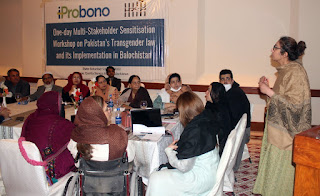Human rights violations and discrimination based on gender identity are still prevalent in Pakistan, posing a severe challenge to the government. Transgender people and other marginalized groups experience far greater stigma, discrimination, and violence than non-marginalized groups. Balochistan's community faces various levels of bias, including being impoverished, tribal, conservative, less educated, or refugee.
On March 5, 2022, Jalila Haider, iProbono's Pakistan Country Representative, hosted a multi-stakeholder sensitization session on Pakistan's Transgender Law and its implementation in Balochistan. This workshop was organized in partnership with Pakistan's Human Rights Commission to:
- Understand the challenges faced by the transgender community in Balochistan.
- Establish a pressure group of members from various schools of thought and civil society in order to encourage lawmakers to introduce provincial legislation to protect the rights of the community.
The event saw participation from members of the transgender community, lawyers, police, journalists, university professors, members of political parties, religious scholars, social and human rights activists, and government officers.
Workshop participants concluded that :
- Transgender and intersex individuals deserve equal and human rights as the rest of the population.
- The transgender community is absolutely invisible in the literature due to society’s complete denial that transgender and intersex persons exist as human beings in our culture.
- Pakistan’s government should take steps to protect the community from all forms of violence, harassment, and discrimination.
- There should be a 5% quota declared for the transgender community in government services and educational scholarships.
- They should also be supplied with a particular identification card or credentials, as well as equal access to health care and shelter facilities.
- Non-governmental organizations and the government should collaborate to create training institutes for the transgender community, and
- A specific cell should be established in prisons, police stations, and courts to address the issues faced by community members.
iProbono intends to continue this effort with more consultations and lobbying throughout the year.
Jalila expressed optimism that "if the Provincial Government uses all of its resources in partnership with civil society and implements our recommendations to introduce a provincial transgender law and policy with full implementing mechanism, we will be able to achieve the goal of a trans-friendly society in Balochistan."
Please contact Jalila and Naima Ahmed, Legal Officer, Pakistan, for more information about iProbono's work with transgender populations in Pakistan. Beyond Gender, a publication that contains information on our work on Equality Law in South Asia.
